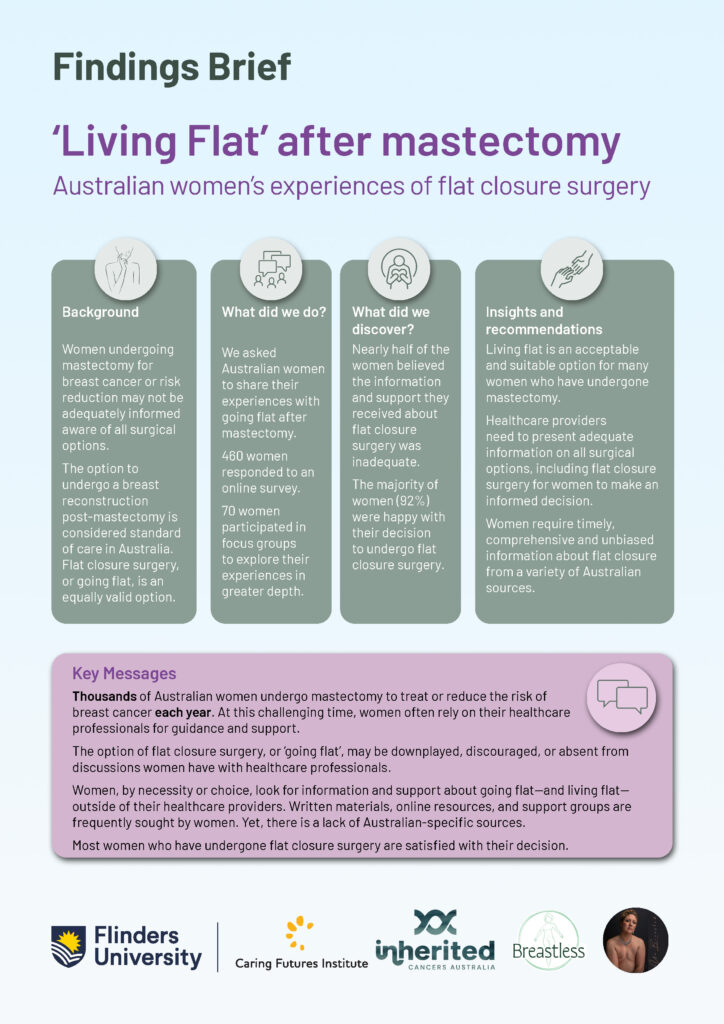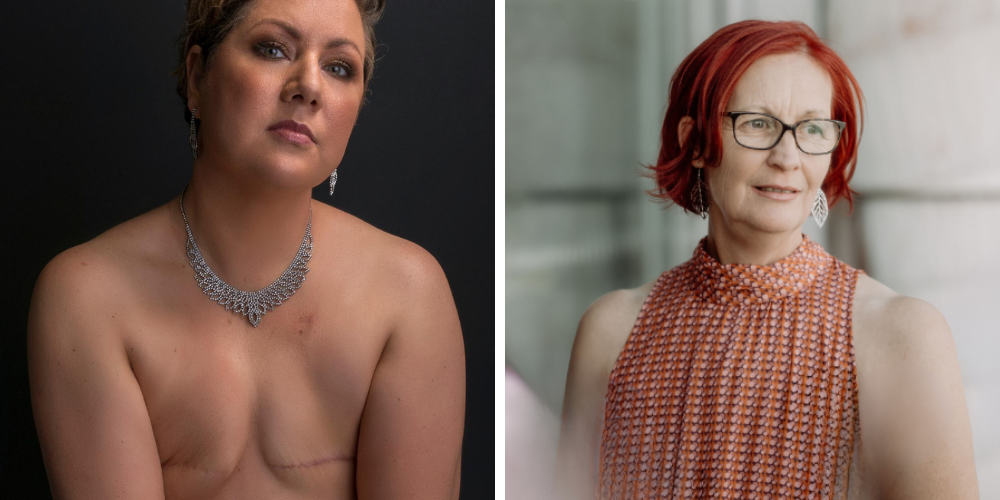
Almost all women who chose not to have a breast reconstruction following a mastectomy say they are happy with their decision, new research can reveal, with advocates now calling for improvements in how post-surgical options are presented.
Undertaken by Flinders University, the survey heard the voices of 460 Australian women who chose to remain flat chested following either a bilateral (double) or unilateral (single) mastectomy: the surgical removal of breast tissue either as treatment for breast cancer, or its prevention for those at high risk.
The research found 92% of women were happy with their decision to undergo flat closure, also known as 'going flat', but more than a quarter reported they had healthcare professionals query their decision and recommend reconstruction, even after the surgery had already occurred. A third of the respondents also reported feeling like their healthcare team were biased towards a particular option.

The results featured in a presentation titled 'There are more important parts of your body than your breasts', at the recent International Conference on Cancer Nursing (ICCN), hosted by the Cancer Nurses Society of Australia (CNSA) and the International Society of Nurses in Cancer Care (ISNCC), in Adelaide.
"Thousands of Australian women undergo a mastectomy in Australia each year but there has been very little research into the experiences of those who choose to go flat," says Dr Fiona Crawford-Williams from the Cancer Survivorship Program at Flinders' Caring Futures Institute, who led the survey.
"By hearing from those who have had to make this decision I hope we can help bring about change, working together with breast care nurses, surgeons, and other healthcare professionals. A well-informed person can't make the wrong decision."
The two-year research project was spearheaded by consumer advocates Robyn Smith, Melanie Law and Joanna Atzori who are calling for improvements to the information, resources and surgical options discussed at the time of undergoing mastectomy for cancer or preventative reasons.
Ms Smith, co-researcher, BCRA gene mutation carrier and co-founder of Flat Life Australia, says the data indicates that healthcare providers and support services must 'do better' by their patients in providing unbiased information from the very beginning of their mastectomy experience.
"During our research we discovered many flat women are routinely asked at follow up consultations whether they've changed their mind about reconstructing their breasts, despite being satisfied with their choice to go flat," says Ms Smith.
"This research data shows the Australian healthcare system needs to better support women so they can make informed decisions about their mastectomy and outcome. This is one of the most personal decisions a woman can make, so let's give women access to unbiased and informative resources."
Co-researcher, breast cancer survivor and flat advocate Melanie Law said she was disappointed that women are not being supported to make their own informed choices about their bodies.
"Healthcare professionals come into our lives at a vulnerable time, when we need their skills, knowledge and expertise, however, we live in our bodies beyond those discussions and need to make the right long-term decisions," says Ms Law.
"We want all options to be presented, with sufficient information and support for women to make informed decisions at what is a very difficult time. I encourage all women to find a way to listen to your own voice, ask the questions, trust yourself and love this amazing body you have and all it does for you."

Fellow breast cancer survivor, co-researcher and flat advocate Joanna Atzori said the research data revealed examples of atrocious treatment of women when researching their mastectomy options, including patients whose surgeons demanded a psychological assessment before they agreed to operate.
"As advocates and researchers, we question why any other person or healthcare provider – male or female – would feel they have the right to interrogate patients and question their psychological and mental state of mind when requesting flat reconstruction," says Mrs Atzori.
"If the patient is clearly stating how they want their body to look, feel and function after mastectomy, nobody else has the right to comment or put forth their personal biases or social beliefs about that patient's wishes."
The researchers say the collective voices of the survey participants loudly affirms that women should have the freedom to choose flat chested outcomes, especially when those body parts (breasts) are considered potentially harmful due to cancer diagnosis or hereditary risk factors.
"Our research shows going flat was the right decision for most women who chose that path and therefore it should be equally presented and supported for those going through this life-changing decision," says Dr Crawford-Williams.
"Patients deserve to have their voices heard when asking for flat closure surgery, not asked to explain themselves or defend their decision."
The full research report can be accessed here.






